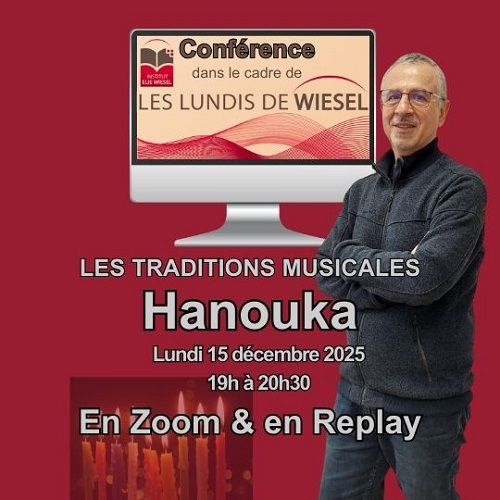
A radio program of the European Institute of Jewish Music hosted by Hervé Roten
MUSIQUES JUIVES D’HIER ET D’AUJOURD’HUI – TUESDAY OCTOBER 22, 2019, JUDAÏQUES FM (94.8), 21H00. Radio program in French
On the occasion of the release of the CD Jacques Offenbach and friends, from the Synagogue to the Opera, Hervé Roten invites the choirmaster and musicologist Hector Sabo who will present the synagogal musical works of Fromental Halévy (1799-1862) and Giacomo Meyerbeer (1791-1864).
Fromental Halévy was born on May 27, 1799 in Paris into a Jewish family. His mother, Julie Mayer, was native of the french region Lorraine. His father, Élie Lévy, came from Fürth, a small town in the north of Nuremberg, where he was a cantor for several years. Surrounded by the songs of the synagogue, young Fromental Halévy revealed very early to be talented for music. At the age of 10, he entered the Paris Music School, where he attended at the age of 12 the class of Cherubini. At the age of 20, he receivesd the Great Prix de Rome. After difficult beginnings in the field of lyrical art, he became famous in 1835 with his opera La Juive, with a libretto by Eugène Scribe. In 1840, Fromental Halévy was appointed composition teacher in the Paris Music School ; among his pupils, one can name Gounod, Bizet and Saint-Saëns. In 1845, he favoured the appointment of Samuel Naumbourg (1817-1880), one of his pupils, to be cantor in the Consistorial Temple of Paris. Between 1847 and 1874, Naumbourg would publish four collections of synagogal music, comprising several compositions by Fromental Halévy. In 1851, the Consistoire of Paris asked Halévy to lead the chanting commission, that was just created to put order in the liturgical chants of the new consistorial service. Fromental Halévy would stay in this commission until 1855. Regularly requested by the Consistoire, Halévy wrote several vocal music for the synagogue, among which the psalm 100 Mizmor lessodo and the psalm 118 Min hametsar which ends the Hallel prayer. This tune for 7 voices was composed by Halévy for the wedding of his nephew, Edgar Rodrigues with Louise Mayer, on May 2, 1858. This psalm is also sung during the inauguration of the Temple of la Victoire, on Septembre 9, 1874.
But Halévy was also the author of a musical version of the psalm 130 Mimaamakim, well known in its latin version under the name De profundis. This work which has an imposing musical formation (orchestra and chorus) results of an order of the cult minister of Louis XVIII to the three official religions of the kingdom of France, in order to commemorate the death of the duke of Berry (1778-1820), nephew of the king and heir to the throne, killed in the night of the 13th to the 14th February 1820. We will listen to excerpts of this work that were yet never put on CD.
Giacomo Meyerbeer, was born Jakob Liebmann Meyer Beer to a wealthy Jewish family, near Berlin in Tasdorf on September 5, 1791. His father, Juda Herz Beer (1769-1825) was very involved in the movement for the emancipation and integration of Prussian Jews. One of his first works done in his youth was a Hallelujah for chorus and organ written in 1815 for the Reform community of Berlin, and sung in his father’s oratory. Between 1816 and 1824, Meyerbeer traveled several times to Italy where he composed several operas. This gave him a notoriety not only in Italy but in all of Europe where he was considered as good as Rossini. Between 1825 and 1841, the essential of his career took place in Paris. With the backing of Luigi Cherubini, on February 18, 1827 he began a very profitable collaboration with Eugène Scribe, the librettist. Their first musical work, Robert le Diable, was performed at the Opera on November 21, 1831 and was a triumph. From 1842, he was the first Jew to be named Meyerbeer Generalmusikdirektor (head musical director) at the Prussian Royal Opera and musical supervisor to the royal court. Director for sacred music was a title given to another composer of Jewish origin, who had converted to Protestantism, Felix Mendelssohn (1809-1847).
In 1846, Samuel Naumbourg asked Meyerbeer the authorisation to arrange his Prière d’enfants (Child’s Prayer), initially published in 1839 for three female a cappella voices, (before being translated into German in 1841 under the name Kindergebet), recited when withdrawing the Torah Scrolls from the Sacred Ark during Shabbat services and holidays. Meyerbeer agreed and Naumbourg created an arrangement for men and children chorus that was published in Paris in 1847 in the second volume of his collection Zemirot Israel, Chants Religieux des Israélites.
From 1851, Meyerbeer continued to live in Berlin with his family and to participate in the rich artistic life of the city. He still managed to regularly travel through Europe presenting his works.
His intense creative activity accelerated is death suddenly on May 2, 1864 in Paris while he was supervising the rehearsals of his latest opera, L’Africaine.
Illustrated with many musical excerpts, this broadcast will make us discover the hebrew work of two of the best opera composers of the 19th century

Ethnomusicologist, he quickly developed an interest in the safeguard and digitization of archives, subjects he taught for several years in Reims and Marne-La-Vallée universities.
Author of many articles, books and recordings related to Jewish music, producer of radio programs, Hervé Roten is recognized today as one of the best specialists of Jewish music in the world.




